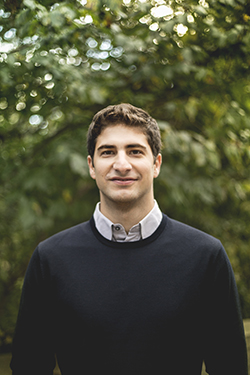Sweden's tradition in environmental protection and sustainability lured Alexandros to KTH
Alexandros Chatzakis comes from the town of Kalamata in Greece. He is a graduate of the master's programme in Environmental Engineering and Sustainable Infrastructure, and now resides in Stockholm working as a water engineer at Sweco.

What made you decide to start studying at KTH?
KTH and Sweden were offering an attractive package. Sweden has a great tradition in environmental protection and sustainability, while KTH is a highly reputable institution, which ensures a high quality of education.
What do you see as the greatest aspects of your programme?
The great variety of courses which cover a broad spectrum of environmental issues. Furthermore, the relatively small number of students render it possible for the teachers to answer all the questions that students may have which lead to a high quality of education.
What does your current job involve?
I am currently working in Stockholm in a consulting firm named Sweco and more specifically in the group “Water and Climate Adaption”. I am working as a water engineer/consultant specialising in flood studies and sustainable stormwater management. Our clients vary from either private entrepreneurs to public actors such as municipalities or the Swedish Transport Administration.
Sweden has high standards and strict demands regarding environmental protection concerning new developments. When it comes to flooding, a new development, such as a new residential area or a new railway, must ensure that it is not vulnerable to flooding as well as that it will not increase the flood risk in the surroundings.
My job is to perform studies by using hydrodynamic models and suggest solutions to meet the demands set by the municipalities and the county administrative board.
Furthermore, apart from flooding, I am also working with studies for green and blue solutions for stormwater management. By taking measures such as green roofs, permeable surfaces and rain gardens, the infiltration of water is promoted, and thus the pollutants ending up in our water recipients are reduced. At the same time, less rainfall turns into surface runoff, reducing the flood risk.
How do you use the knowledge and skills you gained during your degree?
The knowledge and skills from my degree turned out to be essential for finding my current job and for making me capable of performing my job tasks in high quality.
Courses such as “Applied Hydrology”, “Environmental Dynamics” and “Modelling of Water Systems” provided me with the background needed for understanding the principles involved in the water cycle and modelling. Courses such as “Environmental Data” and “Natural Resources Management” provided me with high expertise in GIS which I am now using daily for both performing my analyses and creating explanatory illustrations for my reports.
However, apart from knowledge and technical skills, the master’s programme in Environmental Engineering and Sustainable Infrastructure created the circumstances for developing my soft skills such as problem-solving, team working and communication skills. I consider those merits to be of high importance since those could allow me to succeed in my work even if I had chosen to work in another field than Environmental engineering.
What kind of career opportunities are available in your field?
The master’s programme in Environmental Engineering and Sustainable Infrastructure is a broad programme that covers a broad spectrum of environmental aspects. By all the different courses and tracks, a student can decide to either follow a technical path with a lot of calculations or choose a more academic/policy making path. Fields that someone with this background can work in involve stormwater, groundwater, assessment of environmental impacts, pipe technology, polluted soils, GIS and much more. At the time being there is a big demand for engineers in Sweden since the housing market is booming. However, the majority of the environmental-related jobs in Sweden require knowing the Swedish language, though that is not always the case.
Five things that you would like to advise future students?
My list of advice to students would be:
• Be active and participate substantially in the courses' projects and activities. Do not just focus on passing the courses but aim instead at getting as much knowledge as possible.
• Try to meet new people, learn new customs, share traditions and get influenced by the positives of each culture.
• Start learning Swedish as soon as possible in case you intend to stay in Sweden after your studies.
• Try to do your thesis in a company. That will get you acquainted with the job mark and increase your chances of finding a job. Coming up with a thesis topic yourself will help you to stand out and attract the companies’ interest.
• Do not lose the balance between education/career and personal life. In the long term, nobody will be able to achieve prosperity without one of those two.

